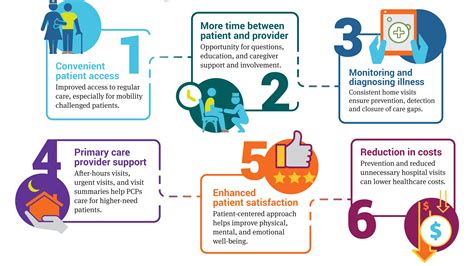Travel patient care is a rapidly growing field that requires innovative solutions to ensure patients receive the best possible care while traveling. With the advancement of technology, healthcare providers can now leverage various tools and platforms to improve patient care, enhance the travel experience, and reduce costs. In this article, we will explore seven ways to improve travel patient care with technology.
1. Telemedicine and Remote Monitoring

Telemedicine and remote monitoring technologies enable healthcare providers to remotely monitor patients' vital signs, track their condition, and provide real-time consultations. This reduces the need for in-person visits, allowing patients to receive care from the comfort of their own homes or while traveling. Telemedicine platforms can also facilitate communication between patients, caregivers, and healthcare providers, ensuring seamless care coordination.
Benefits of Telemedicine
- Improved access to care for patients with mobility issues or those living in remote areas
- Reduced hospital readmissions and lengths of stay
- Enhanced patient engagement and satisfaction
- Cost savings through reduced transportation and accommodation costs
2. Electronic Health Records (EHRs)

Electronic Health Records (EHRs) are digital versions of patients' medical records, containing their medical history, test results, medications, and other relevant information. EHRs enable healthcare providers to access and share patient information securely, ensuring continuity of care and reducing errors. EHRs can also facilitate care coordination, improve patient safety, and enhance the overall quality of care.
Benefits of EHRs
- Improved accuracy and completeness of patient information
- Enhanced care coordination and communication among healthcare providers
- Increased patient safety and reduced medical errors
- Streamlined clinical workflows and improved productivity
3. Mobile Health (mHealth) Apps

Mobile Health (mHealth) apps are designed to support patients' health and wellness, providing tools for tracking vital signs, monitoring medication adherence, and accessing health information. mHealth apps can also facilitate communication between patients and healthcare providers, enabling remote consultations and care coordination. By leveraging mHealth apps, patients can take a more active role in their care, improving health outcomes and reducing costs.
Benefits of mHealth Apps
- Improved patient engagement and empowerment
- Enhanced care coordination and communication
- Increased access to care and reduced wait times
- Cost savings through reduced hospital readmissions and lengths of stay
4. Predictive Analytics and Artificial Intelligence (AI)

Predictive analytics and Artificial Intelligence (AI) can help healthcare providers identify high-risk patients, predict health outcomes, and develop targeted interventions. By analyzing large datasets, predictive analytics and AI can uncover patterns and insights that inform care decisions, reduce costs, and improve patient outcomes.
Benefits of Predictive Analytics and AI
- Improved patient outcomes through targeted interventions
- Enhanced care coordination and reduced hospital readmissions
- Increased efficiency and productivity through automation
- Cost savings through reduced lengths of stay and avoided complications
5. Wearable Devices and IoT Sensors

Wearable devices and IoT sensors can track patients' vital signs, monitor their activity levels, and detect changes in their condition. This data can be used to develop personalized care plans, improve patient engagement, and reduce hospital readmissions.
Benefits of Wearable Devices and IoT Sensors
- Improved patient safety and reduced medical errors
- Enhanced care coordination and communication among healthcare providers
- Increased patient engagement and empowerment
- Cost savings through reduced hospital readmissions and lengths of stay
6. Virtual Reality (VR) and Augmented Reality (AR)

Virtual Reality (VR) and Augmented Reality (AR) can be used to support patient care, providing immersive experiences that reduce anxiety, pain, and stress. VR and AR can also facilitate therapy, improve patient engagement, and enhance the overall care experience.
Benefits of VR and AR
- Improved patient satisfaction and reduced anxiety
- Enhanced care coordination and communication among healthcare providers
- Increased patient engagement and empowerment
- Cost savings through reduced hospital readmissions and lengths of stay
7. Blockchain and Secure Data Sharing

Blockchain technology can facilitate secure data sharing, enabling healthcare providers to access and share patient information while maintaining confidentiality and integrity. By leveraging blockchain, healthcare providers can improve care coordination, reduce medical errors, and enhance patient safety.
Benefits of Blockchain and Secure Data Sharing
- Improved patient safety and reduced medical errors
- Enhanced care coordination and communication among healthcare providers
- Increased patient engagement and empowerment
- Cost savings through reduced hospital readmissions and lengths of stay





What is the role of technology in travel patient care?
+Technology plays a crucial role in travel patient care, enabling healthcare providers to remotely monitor patients, provide real-time consultations, and access patient information securely.
What are the benefits of telemedicine in travel patient care?
+Telemedicine enables patients to receive care from the comfort of their own homes or while traveling, reducing the need for in-person visits and improving access to care.
How can wearable devices and IoT sensors improve travel patient care?
+Wearable devices and IoT sensors can track patients' vital signs, monitor their activity levels, and detect changes in their condition, enabling healthcare providers to develop personalized care plans and improve patient outcomes.
In conclusion, technology has the potential to revolutionize travel patient care, improving patient outcomes, reducing costs, and enhancing the overall care experience. By leveraging telemedicine, EHRs, mHealth apps, predictive analytics, wearable devices, VR, and blockchain, healthcare providers can deliver high-quality care to patients while traveling, ensuring seamless care coordination and communication.
